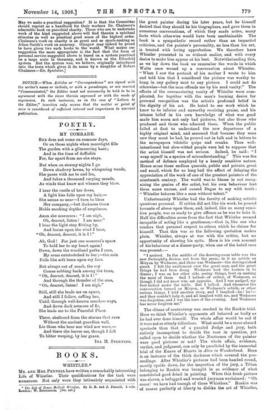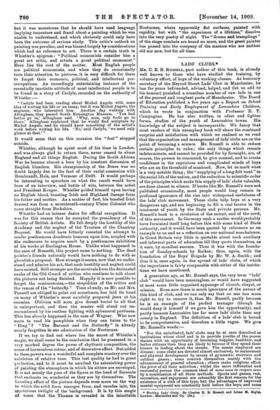BOOKS.
WHISTLER.*
MR. AND MRS. PENNELL have written a remarkably interesting Life of Whistler. Their qualifications for the task were numerous. Not only were they intimately acquainted with • The. Life of Jaws McheiU Whistler. By E. R. and J. Pennell. 2 vela. London; W. Heinemann. [36s. net.] the great painter during his later years, but he himself desired that they should be his biographers, and gave them in numerous conversations, of which they made notes, many facts which otherwise would have been unobtainable. The book is a sympathetic record rather than an impartial criticism, and the painter's personality, no less than his art,
is treated with loving approbation. We therefore have Whistler presented to us without malice, and with every desire to make him appear at his best. Notwithstanding this, as we lay down the book we remember the words in which Watts once wound up a conversation about Whistler. " When I saw the portrait of his mother I wrote to him and told him that I considered the picture was worthy to hang in any gallery next to any picture. I could not do otherwise—but the man offends me by his mad vanity." The effects of the overmastering vanity of Whistler were com- plicated, for together with the man's burning desire for personal recognition was the artist's profound belief in the dignity of his art. He hated to see work which he knew to be inferior and unworthy receiving praise, and his
intense belief in his own knowledge of what was good made him scorn not only bad pictures, but also those who produced and those who admired them. When the public failed at first to understand the new departures of a highly original mind, and assumed that because they were new they must be bad, he poured out in talk and in letters to the newspapers -vitriolic quips and cranks. Thus well-
intentioned but slow-witted people were led to suppose that the artist himself was not serious. Indeed, he said : " I wrap myself in a species of misunderstanding." This was the method of defence employed by a keenly sensitive nature. Hence arose those endless quarrels, public and private, great and small, which for so long had the effect of delaying the appreciation of the work of one of the greatest painters of the
nineteenth century. The world was to blame in not recog- nising the genius of the artist, but his own behaviour lent them some excuse, and caused Degas to say with truth : " Whistler behaves like a man without talent."
Unfortunately Whistler had the faculty of making artistic questions personal. If critics did not like his work, he poured torrents of abuse upon them, and, indeed, like so many sensi- tive people, was as ready to give offence as he was to take it. Half the difficulties arose from the fact that Whistler seemed
incapable of acting like a gentleman,—that is, like one who renders that personal respect to others which he claims for himself. That this was so the following quotation makes plain. Whistler, always at war with the critics, lost no opportunity of showing his spite. Here is his own account of his behaviour at a dinner-party, when one of the bated race was present :-
"I arrived. In the middle of the drawing-room table was the new Fortnightly Review, wet from the press ; in it an article on Meryon by Wedmore, and there was Wedmore—the distinguished guest. I felt the excitement over the great man, and the great things he had been doing. Wedmore took the hostess in to dinner ; I was on her other side, seeing things, bent on making the most of them. And I talked—of critics, of Wedmore, as though I did not know who sat opposite. And I was nudged, my foot kicked under the table. But I talked. And whenever the conversation turned on Meryon, or Wedmore's article, or other serious things, I told another story, and I laughed—ha! ha !- and they couldn't help it, and all laughed with me, and Wedmore was forgotten, and I was the hero of the evening. And Wedmore has never forgiven me."
The climax of controversy was reached in the Ruskin trial.
Here we think Whistler's opponents all behaved as badly as he had ever done himself. The whole affair would be sad if it were not so utterly ridiculous. What could be a more absurd spectacle than that of a puzzled Judge and jury, both entirely incompetent to decide the case in question, yet called upon to decide whether the Nocturnes of the painter were good pictures or not? The whole affair, evidence,
verdict, and judgment, can only be paralleled by the immortal trial of the Knave of Hearts in Alice in Wonderland. Here is an instance of the thick darkness which covered the pro-
ceedings. After Whistler's pictures had been handed round, mostly upside down, for the inspection of the jury, a Titian belonging to Ruskin was brought in as evidence of what constituted good detail in painting. When this fresh picture was shown, a befogged and wearied juryman exclaimed : " Oh come! we have had enough of these Whistlers." Ruskin was of course perfectly at liberty to dislike the art of Whistler, but it was monstrous that he should have used language implying imposture and fraud about a painting which he was unable to understand, and which obviously could only have been the outcome of serious study. This critic's outlook on painting was peculiar, and was biassed largely by considerations which had no reference to art. • There is a certain truth in • Whistler's epigrarri "Political economists consider him a great art critic, and artists a great political economist."
• Here lies the root of the matter. Most English people are political economists, and when they do occasionally turn their attention to pictures, it is very difficult for them to forget their economic, political, and intellectual pre- occupations. An exceedingly entertaining instance of the essentially inartistic attitude of most intellectual people is to be found in a story of Carlyle, recorded on the authority of Whistler :-
" Carlyle had been reading about Michel Angelo with some idea of writing his life or an essay, but it was Michel Angelo, the engineer, who interested him. Another day walking with Allingham, they passed South Kensington Museum. You had better go in,' Allingham said. Why, mon, only fools go in there.' Allingham explained that he would find sculpture by Michel Angelo, and he should know something of the artist's work before writing his life. `No,' said Carlyle, we need only glance at that.'"
It would seem that on this occasion the "fool" stopped outside.
liThistler, although he spent most of his time in London, and was always glad to return there, never ceased to abuse England and all things English. During the South African • War he became almost a bore by his constant discussion of English blunders. His championship of the Boers was no doubt largely due to the fact of their racial connexion with Rembrandt, Bala, and Vermeer of Delft. It would perhaps be interesting to speculate on what the result would have been of an interview, and battle of wits, between the artist and President Kruger. Whistler prided himself upon having no English blood, boasting Irish and Highland lineage from his father and mother. As a matter of fact, his boasted Irish descent was from a seventeenth-century Ulster Colonist who came straight from Berkshire.
Whistler had an intense desire for official recognition. It was for this reason that he accepted the presidency of the Society of British Artists. He felt deeply the hostility of the Academy and the neglect of the Trustees of the Chantrey Bequest. He would have bitterly resented the attempt to confer posthumous Academic honours upon him, coupled with the endeavour to acquire merit by a posthumous exhibition of his works at Burlington House. Unlike what happened in the case of Rossetti, this project came to nothing. The dead painter's friends naturally would have nothing to do with so ghoulish a proposal. How strange it seems, now that we under- stand and admire his art, that such hostility and neglect could have existed. Still stranger are the survivals from the decimated ranks of the Old Guard of critics who continue to talk about the pictures not being finished. Happily it is now possible to forget the controversies,—the stupidities of the critics and the venom of the "butterfly." Time already, as Mr. and Mrs.
Pennell are obliged to point out sometimes, has laid its baud on many of Whistler's most carefully prepared jeers at his
enemies. Oblivion will soon give decent burial to all that is unimportant, and then the master will stand out un- encumbered by his restless fighting with ephemeral partisans. This has already happened in the case of Waguer. Who now -cares to read his pamphlets when they can listen to the " Ring " F " The Baronet and the Butterfly " is already -nearly forgotten in our admiration of the Nocturnes.
If we try to find out where lies the secret of Whistler's magic, we shall come to the conclusion that he possessed in a very marked degree the power of rhythmic composition, the sense of harmonious colour, and of decorative effect. But added to these powers was a wonderful and complete mastery over the subtleties of relative tone. This last quality he had in great • perfection, and to it must be ascribed the astonishing power of painting the atmosphere in which his sitters are enveloped.
It is not merely the pose of the figure or the head of Sarasate
that enchants us, wonderful as they are by themselves. The haunting effect of the picture depetids even more on the way in which the solid form emerges from, and recedes into, the mysterious twilight of the background. It is by this magic
of tones that the Thames is revealed in the inimitable Nocturnes, where apparently flat surfaces, painted with rapidity, but with " the experience of a lifetime," dissolve into the very poetry of night. The "drums and tramplings" of the stage combats are heard no more, and the great painter has passed into the company of the masters who are neither old nor new, but for all time.











































 Previous page
Previous page